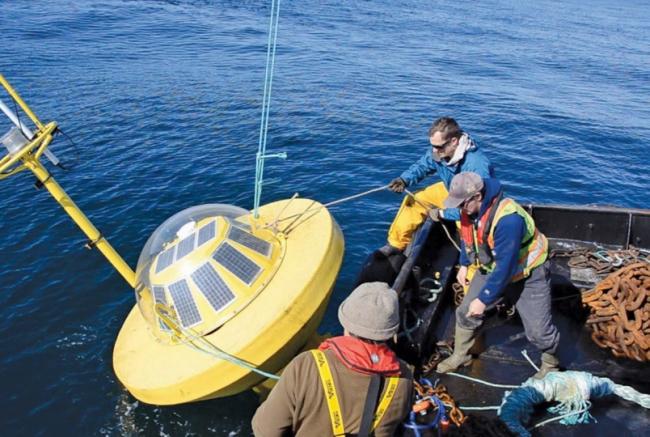Articles Menu

The sinking of a diesel-laden tug near Bella Bella has a First Nations community on Vancouver Island becoming even more committed to renewable energy.
Hesquiaht First Nation, on the west coast of Vancouver Island near Hot Springs Cove, relies on a diesel generator to provide electricity for about 70 residents.
That means the diesel engine runs round the clock. A barge with three tanker trucks carrying full loads of diesel fuel, totalling 45,000 litres, docks at Hesquiaht every eight weeks to replenish the village tank farm.
Cecil Sabbas, Hesquiaht First Nation fisheries manager, said now more than ever, his community is considering clean, alternative energy sources to reduce reliance on the diesel-powered generator. “We have all been watching that Bella Bella thing,” said Sabbas in a recent telephone interview. “It causes us great concern because we have that barge coming to our place every eight weeks or so.”
Near Bella Bella, cleanup continues on the Oct. 13 spill, when a tugboat hauling a barge sank with more than 200,000 litres of diesel and other oil products on board. Nearby shellfish harvesting has been closed. The Heiltsuk First Nation near the spill site has called the incident an “environmental disaster.”
The news has turned interest in Hesquiaht in renewable energy sources such as a small-scale hydroelectric plant, wind turbines, solar power or wave power into something a little more urgent. “I’m thinking if we could go with integrating different sources of green energy, we might be away from the generator for much of the time,” said Sabbas.
Hesquiaht First Nation is one of the small, isolated coastal communities being studied by a University of Victoria group considering wave power as a source of energy.
Bryson Robertson, UVic adjunct professor of mechanical engineering, said money alone makes wave energy worth examining for Hesquiaht. A diesel generator means energy costs of as much as 60 cents per kilowatt-hour. (Victoria and other communities on the main grid pay eight to 11 cents.)
Robertson and his colleagues at West Coast Wave Initiative are mapping wave energy available along the B.C. coast using data-collecting buoys.
He said he is in discussions with companies that make wave-driven generators. These could be things like door-like flaps hinged to the ocean bottom moving back and forth with the waves, or buoys capturing energy as waves bounce them up and down.
“[The Hesquiaht] have a resource in the ocean and it’s right in front of them,” said Robertson. “I’m not saying the technology is ready to use tomorrow. But a reasonable short-term goal is to get it in quite quickly.”
Robertson said a move by the Hesquiaht to something like wave power can be seen as part of a larger global phenomenon where advances in technologies are allowing some communities to skip over the big, complex stages of industrial uptake of scientific advances.
Many Africans, for example, have skipped the development of land-based telephone transmission lines and gone straight to digital phones, cellular or satellite. According to a 2015 report from the Washington-based Pew Research Centre, mobile phones are as common in South Africa and Nigeria as they are in the U.S.
Another example is Bangladesh, where since 2003, government assistance has allowed solar panels to be installed on 3.95 million rural homes. Many of the homes are thatch-roof huts, but the number, according to a recent New York Times story, makes the country one of the largest solar markets in the world.
In Hesquiaht’s case, it could meaning skipping the extension of the main electrical grid.
Robertson said that too often, we tend look for big solutions to problems of engineering or development. We overlook small-scale solutions that can be applied more quickly and more cheaply.
Also, in B.C., popular judgment can become clouded because the province has such a rich source of inexpensive hydro-electrical power in its rivers.
But in a case like that of Hesquiaht, or any other isolated B.C. community off the main utility grid, extending electricity can mean an enormous cost of erecting power lines.
So Robertson said the more intelligent solution is often a smaller-scale, local initiative. Being a wave-energy specialist, he was more enthusiastic about wave and tidal energy for B.C. than solar (it’s too often too cloudy) or wind (irregular).
But Robertson and Sabbas both said they didn’t believe Hesquiaht could give up entirely on its diesel generators in the near future. After all, the immediate goal is to provide the community with reliable power at the flick of a switch.
“Chances are, there will always be times when you don’t have sun or waves or wind,” said Robertson. “It’s all about having dispatchable power, which is what the generator is.”
But Sabbas said he just doesn’t like the idea of running a diesel engine emitting exhaust gases non-stop in his community.
Furthermore, the diesel is expensive. The barge alone costs upwards of $3,500 per trip. Then there is the engine maintenance, not to mention the upkeep of the community tank farm for fuel storage.
But mostly, reducing reliance on diesel in favour of renewable energy would enrich the lives of the Hesquiaht people.
It could mean a small pay raise for community administrators, who haven’t had one in years. Or it could mean a fix-up for the crumbling recreation centre. Even community craft nights, cancelled for lack of money, could be resumed.
“These are simple little things, but they allowed us to interact with each other,” said Sabbas. “Maybe we could even start creating some new programs.”
[Top photo: A crew handles a buoy that measures wave energy. Bryson Robertson, UVic adjunct professor of mechanical engineering, said reduced costs alone make wave energy worth examining for Hesquiaht First Nation, since diesel generators are expensive. Photograph By University of Victoria]